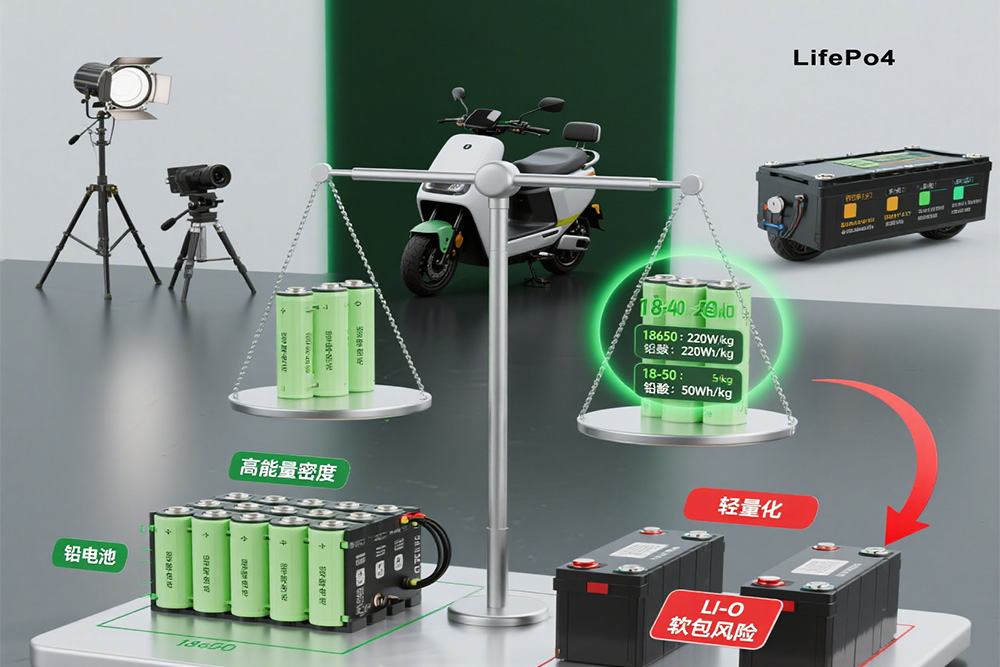Versus Lead-Acid Battery Packs
Advantages:
Higher Energy Density:
18650 lithium cells offer 3–5 times the energy density of lead-acid batteries. A 12V 4S 18650 battery pack stores more energy in the same volume and weighs less (typically 1–1.5 kg vs. over 5 kg for a similar-capacity lead-acid pack), making it ideal for portable devices.
Longer Cycle Life:
High-quality 18650 batteries last 500–1000 cycles, while lead-acid batteries typically last only 200–300 cycles, reducing long-term replacement costs.
Lower Self-Discharge Rate:
18650 cells self-discharge at a rate of less than 5% per month, compared to 10–15% for lead-acid batteries. They retain power better during storage.
Disadvantages:
Higher Initial Cost:
The materials and BMS required for a lithium pack raise the price, often making it 2–3 times more expensive than lead-acid batteries.
Protection Circuit Required:
Lithium batteries need a BMS to prevent overcharge or over-discharge, while lead-acid batteries have simpler protection needs.
Versus Lithium Polymer (Li-Po) Battery Packs
Advantages:
Stronger Structural Integrity:
Steel-encased 18650 cells resist puncture and compression better than soft-pack Li-Po cells, improving safety—especially in environments with vibration or impact.
Higher Standardization:
18650 cells follow well-established specifications and manufacturing processes, ensuring better consistency. In contrast, Li-Po cells require custom molds and designs, increasing cost.
Better High-Temperature Performance:
18650 batteries operate reliably between -20°C and 60°C. Some Li-Po cells suffer from faster performance degradation at high temperatures.
Disadvantages:
Less Flexibility in Shape and Size:
The cylindrical shape of 18650 cells limits their use in ultra-thin or irregularly shaped devices, such as slim drones, where Li-Po excels.
Slightly Heavier:
At the same capacity, 18650 packs weigh about 10–20% more due to the steel casing.
Versus Nickel-Metal Hydride (Ni-MH) Battery Packs
Advantages:
Higher Voltage Platform:
A single 18650 cell charges up to 4.2V, and a 4S configuration provides a 12V nominal output. In contrast, Ni-MH cells only offer 1.2V each—requiring 10 cells for 12V, increasing size and weight.
No Memory Effect:
18650 cells can recharge at any time without reducing lifespan. Ni-MH batteries can suffer from memory effect if not fully discharged.
Superior Energy Density:
18650 batteries offer 200–250 Wh/kg, while Ni-MH typically delivers only 80–120 Wh/kg. This results in a noticeable difference in runtime.
Disadvantages:
Higher Safety Demands:
Ni-MH batteries carry lower risk of thermal runaway. Lithium batteries can overheat or catch fire if overcharged or short-circuited, making BMS protection essential.
Weaker Low-Temperature Performance:
Ni-MH batteries perform better below -10°C. Some 18650 cells lose more than 50% capacity in extreme cold.
Versus Lithium Iron Phosphate (LiFePO₄) Battery Packs
Advantages:
Higher Energy Density:
Ternary 18650 cells provide 200–250 Wh/kg, while LiFePO₄ delivers 140–180 Wh/kg. This allows smaller and lighter designs for the same capacity.
Higher Voltage Platform:
A fully charged ternary 18650 cell reaches 4.2V (16.8V in a 4S pack), compared to 3.65V per LiFePO₄ cell (14.6V in 4S), making 18650 packs better suited for 12V devices that prefer higher input voltage.
Disadvantages:
Lower Safety Margin:
LiFePO₄ cells maintain excellent thermal stability, igniting only above 200°C. Ternary 18650 cells ignite at around 150°C, requiring stricter BMS and heat management.
Shorter Cycle Life:
LiFePO₄ batteries can reach over 2000 cycles, while 18650 lithium cells generally support 500–1000 cycles. In high-frequency charge/discharge applications, LiFePO₄ has a clear advantage.
Summary of Pros and Cons
| Comparison Dimension | 12V 4S 18650 Battery Pack | Other Battery Types |
|---|---|---|
| Energy Density | High (ideal for portable devices) | Lead-acid / Ni-MH: low LiFePO₄ / Li-Po: moderate |
| Cost | Medium to high (higher initial investment) | Lead-acid / Ni-MH: low Li-Po / LiFePO₄: medium to high |
| Safety | Relies on BMS protection; steel shell offers better safety than Li-Po but lower than LiFePO₄ | Lead-acid / Ni-MH: high safety LiFePO₄: best thermal stability |
| Size & Weight | Compact and lightweight (better than lead-acid / Ni-MH) | Li-Po: customizable ultra-thin LiFePO₄: similar in size to 18650 |
| Cycle Life | Medium (500–1000 cycles) | LiFePO₄: >2000 cycles Lead-acid / Ni-MH: shorter |
| Ideal Applications | Portable devices, power tools, small-scale energy systems | Lead-acid: suitable for low-speed vehicles LiFePO₄: ideal for power batteries Li-Po: fits ultra-thin designs |
12V 4S 18650 battery pack excels in energy density, compact size, and voltage compatibility, making it especially suitable for scenarios that demand portability and long battery life. However, safety and cost considerations should be balanced based on the specific application needs.


Leave a Reply